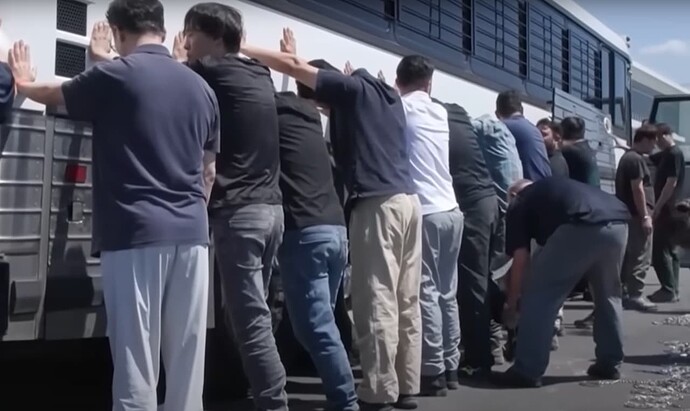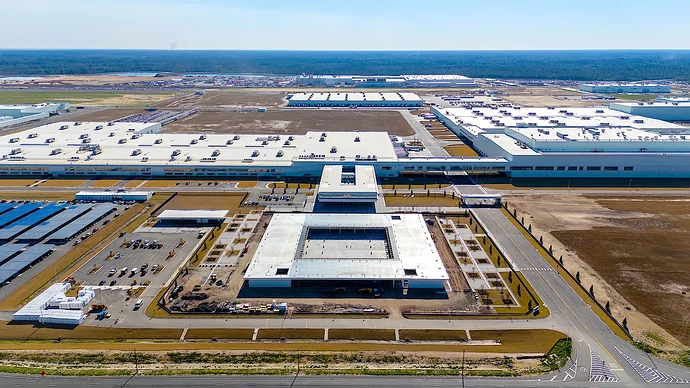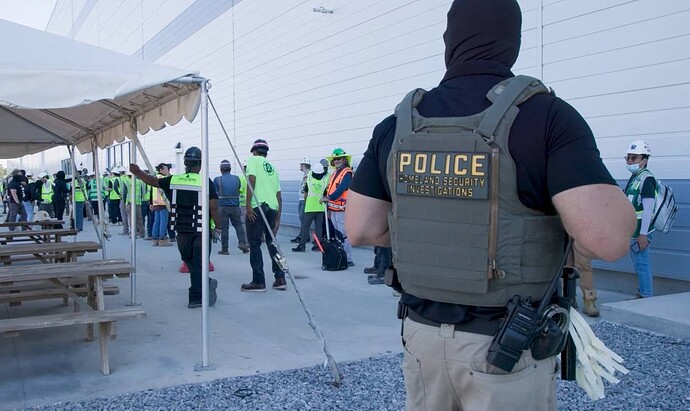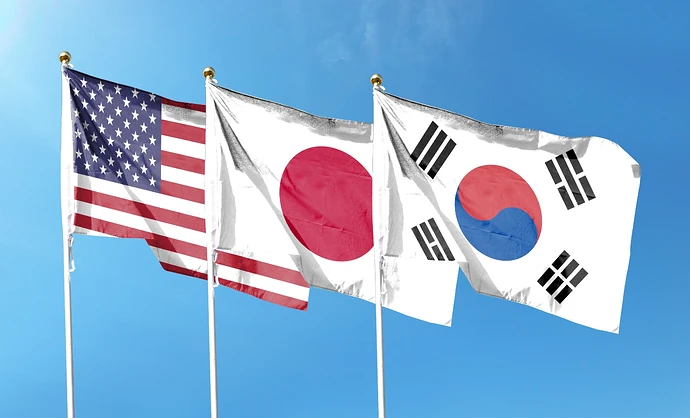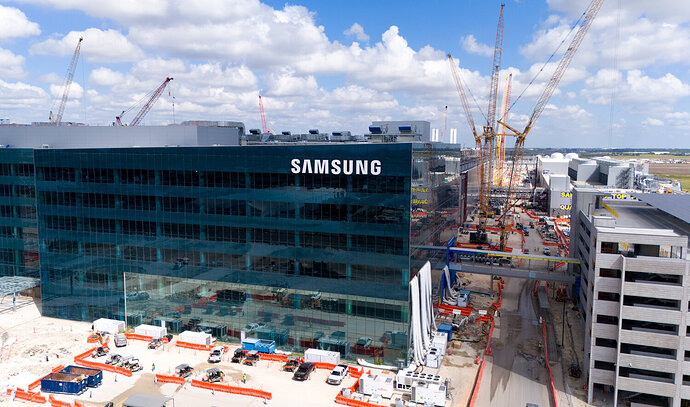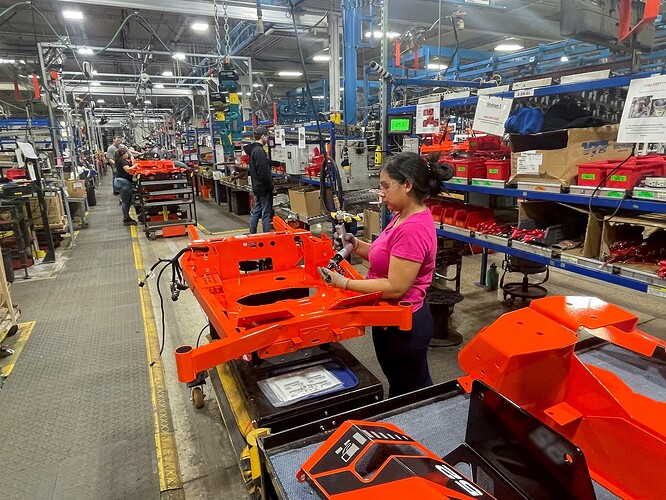On September 4, 2025, a massive U.S. Immigration and Customs Enforcement (ICE) raid shook the Hyundai-LG Energy Solution (LGES) battery plant construction site in Ellabell, Georgia. Dubbed “Operation Low Voltage,” the operation detained 475 workers, including over 300 South Korean nationals, in what the U.S. Department of Homeland Security (DHS) called its largest single-site enforcement action ever.
This high-profile raid has sparked outrage, diplomatic tensions, and serious questions about the United States’ ability to balance its immigration policies with its ambitions to attract foreign investment and maintain strong alliances. As the dust settles, the incident exposes deep flaws in U.S. policy coordination, raising concerns about its economic credibility and reindustrialization goals.
The Raid: What Happened?
The Hyundai-LGES battery plant, a $4.3 billion joint venture to produce electric vehicle (EV) battery cells for Hyundai, Kia, and Genesis vehicles, is a cornerstone of Georgia’s economic development. Located near Savannah, the project is part of Hyundai’s $12.6 billion investment in the state, hailed by Governor Brian Kemp as a “game-changer” for jobs and innovation.
However, on September 4, nearly 500 federal, state, and local officers— including ICE’s Homeland Security Investigations (HSI), FBI, DEA, ATF, and Georgia State Patrol— descended on the site. The operation targeted alleged unlawful employment practices and other federal violations, following months of investigation triggered by community complaints and former workers’ tips.
Of the 475 detained workers, over 300 were South Korean citizens, with 47 being direct LGES employees (46 South Koreans and one Indonesian) and the majority employed by subcontractors. ICE reported that the workers were either illegally present, had overstayed visas, or were working without authorization—often on short-term or recreational visas like B-1 (business) or ESTA (visa waiver program), which prohibit employment.
Some workers reportedly fled, hiding in air ducts or a sewage pond, suggesting awareness of their precarious legal status. Detainees were taken to ICE’s Folkston, Georgia, detention facility, where they faced potential deportation or release pending administrative processes.
Immediate Fallout: Economic and Diplomatic Ripples
The raid sent shockwaves through both the local community and international relations, particularly with South Korea, a key U.S. ally.
Economic Disruption
Construction at the battery plant, a critical component of Hyundai’s EV supply chain, was halted, threatening delays to its 2026 production timeline. LGES suspended U.S.-bound business travel and dispatched its chief human resources officer to address the crisis, while Hyundai distanced itself, stating that none of the detained workers were its direct employees. Both companies pledged cooperation with authorities but emphasized their commitment to legal compliance.
The pause in construction, combined with potential reputational damage, has raised concerns about the project’s long-term viability and Georgia’s economic prospects.Local reactions were mixed. Some residents, like Ellabell’s Tanya Cox, expressed frustration that the project prioritized foreign workers over local hires, echoing sentiments that fueled ICE’s investigation. However, Georgia’s Democratic Party and advocacy groups like Asian Americans Advancing Justice-Atlanta condemned the raid as a politically motivated stunt, arguing it undermines the state’s economy by targeting a flagship project.
Diplomatic Tensions
South Korea, a 70-year ally of the U.S., reacted with dismay. Foreign Minister Cho Hyun expressed “concern and regret,” while President Lee Jae Myung ordered “all-out efforts” to support the detained workers.
South Korea quickly negotiated their release, arranging a chartered plane to bring them home once administrative steps are completed. Korean media outlets, such as Dong-A Ilbo, labeled the raid a “diplomatic disaster” and a “betrayal,” noting its timing— just 11 days after a summit where President Lee pledged an additional $150 billion in U.S. investments, including $26 billion from Hyundai.
The incident strained U.S.-South Korea relations, with Korea’s Foreign Ministry raising concerns about the treatment of its citizens and the potential infringement on its investors’ rights. The raid’s optics—handcuffed Korean workers loaded onto buses—amplified perceptions of U.S. hostility, prompting warnings of a “chilling effect” on future Korean investments.
The Bigger Picture: U.S. Immigration Policy and Investment Climate
The raid is a stark manifestation of the Trump administration’s aggressive immigration enforcement agenda, which has intensified since 2025. With a $1.7 billion ICE budget and a mandate for 3,000 daily arrests, workplace raids targeting farms, construction sites, and restaurants have surged. President Trump defended the operation, stating, “They were illegal aliens, and ICE was just doing its job,” while emphasizing that the U.S. welcomes “legal investment and talent.” However, the raid’s fallout reveals a troubling disconnect between America’s immigration crackdowns and its economic goals.
Why Were Korean Workers Targeted?
Contrary to the narrative of “illegal immigrants” as border crossers, many detained Korean workers likely entered the U.S. legally but violated visa terms. For example, B-1 or ESTA visas allow short-term technical guidance but prohibit direct labor. Subcontractors, often used to cut costs, may have failed to verify workers’ statuses or misclassified their roles, leading to widespread violations. Hyundai and LGES, while not directly implicated, faced scrutiny for lax oversight of their subcontractors, highlighting a systemic issue in globalized supply chains.
Damage to U.S. Investment Credibility
The raid has sparked fears that foreign investors, particularly from allied nations like South Korea, may hesitate to commit to U.S. projects. The U.S. has aggressively courted foreign manufacturers, offering tax breaks and subsidies to bolster domestic industries like EVs and semiconductors.
South Korean firms alone have invested over $350 billion in recent years, driven by market access and tariff avoidance. Yet, the raid’s timing—targeting a high-profile ally’s project—sends a mixed message: invest in America, but expect unpredictable enforcement.Critics argue that such actions undermine the U.S.’s reputation as a stable investment destination.
Dong-A Ilbowarned that the incident could deter Korean firms from future U.S. projects, potentially redirecting capital to the EU or Japan. Smaller companies, lacking the resources of giants like Hyundai, may be particularly wary, fearing legal and operational risks.
Strain on Ally Relations
South Korea’s swift diplomatic response underscores the raid’s geopolitical cost. As a key partner in countering China’s supply chain dominance, Korea’s investments align with U.S. strategic interests.
The raid, however, risks alienating a vital ally, prompting questions about whether domestic political priorities—such as appeasing anti-immigration voters—are jeopardizing broader foreign policy goals. Foreign Minister Cho’s threat to visit Washington signals the depth of Korea’s frustration, while advocacy groups warn that similar actions could erode trust with other allies.
Anti-Immigration Zeal: A Double-Edged Sword
The Trump administration’s immigration policies, while popular among certain voters, pose significant risks to America’s economic and diplomatic standing.
Economic Risks
The raid highlights a tension between immigration enforcement and economic growth. By targeting foreign workers, ICE aims to “protect American jobs,” as HSI agent Steven Schrank stated.
Yet, industries like construction and manufacturing often rely on foreign expertise, especially for specialized projects like EV battery plants.
Local labor shortages, coupled with the complexity of U.S. visa systems, make foreign workers essential for many firms. Overzealous enforcement could exacerbate labor shortages, delay projects, and increase costs, ultimately harming U.S. competitiveness.Moreover, the raid’s disruption of a major economic project contradicts the federal and state governments’ push for reindustrialization.
Georgia, a Republican stronghold, has bet heavily on foreign investment to drive growth, yet federal actions like this risk alienating the very partners needed to sustain it.
Credibility Concerns
The U.S.’s inconsistent messaging—welcoming investment while cracking down on workers—undermines its credibility. Foreign firms may question whether political shifts or enforcement priorities could jeopardize their operations. The raid’s political undertones, criticized by Democrats as a “fear tactic,” amplify perceptions of instability, potentially deterring investment in critical sectors like clean energy and technology.
Reindustrialization at Risk?
The Hyundai-LGES raid casts a shadow over America’s reindustrialization ambitions. The U.S. aims to rebuild its manufacturing base through initiatives like the CHIPS Act and EV subsidies, but success hinges on foreign capital and expertise. South Korea, with its leadership in batteries and semiconductors, is a linchpin in this strategy. Yet, incidents like this could slow progress by:
-
Delaying Projects: The battery plant’s construction pause threatens Georgia’s economic goals and the U.S.’s EV supply chain resilience.
-
Discouraging Investment: Foreign firms may seek alternatives in countries with more predictable regulatory environments.
-
Exacerbating Labor Shortages: Strict visa rules and enforcement could limit access to skilled workers, hampering complex projects.
To mitigate these risks, the U.S. must streamline its visa system, align federal and state priorities, and ensure that enforcement actions consider diplomatic and economic consequences. Without such adjustments, America’s reindustrialization vision could falter.
Looking Ahead: Can the U.S. Recover?
The U.S. has shown some capacity for course correction. South Korea’s successful negotiation to release its workers and Trump’s past pauses on raids in agriculture and hospitality suggest flexibility in response to economic pressures. However, long-term success requires addressing the root causes of policy incoherence:
-
Visa Reform: Simplifying visa categories for technical workers could reduce compliance risks for foreign firms.
-
Subcontractor Oversight: Companies like Hyundai and LGES must strengthen due diligence to ensure subcontractors adhere to U.S. laws.
-
Policy Coordination: Federal and state governments should align immigration enforcement with economic goals to avoid undermining key projects.
For now, the Hyundai-LGES raid serves as a cautionary tale. While the U.S. remains an attractive investment destination, its aggressive immigration stance risks alienating allies and investors alike. If America is to lead in reindustrialization, it must balance enforcement with economic pragmatism—or risk losing the trust of those it needs most.
